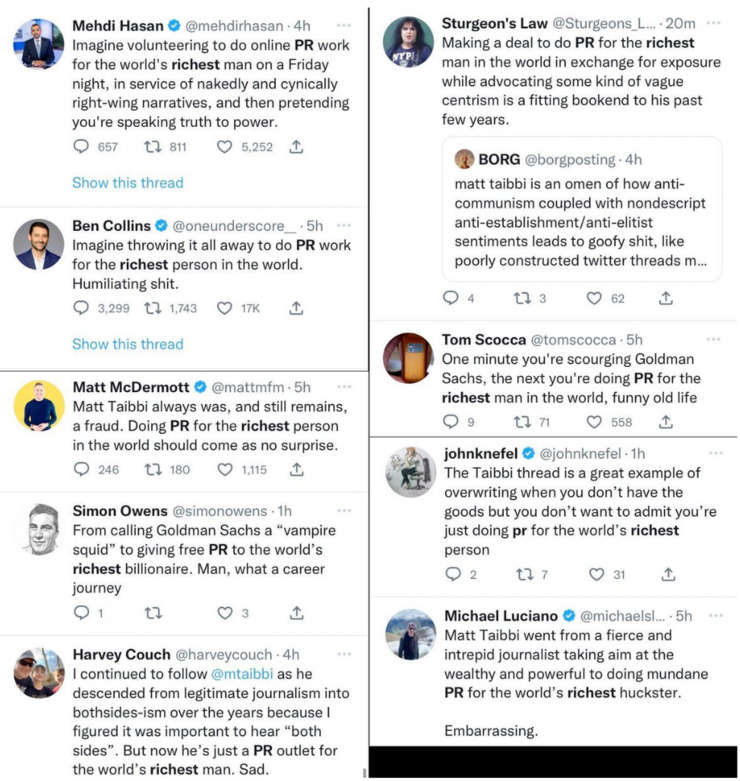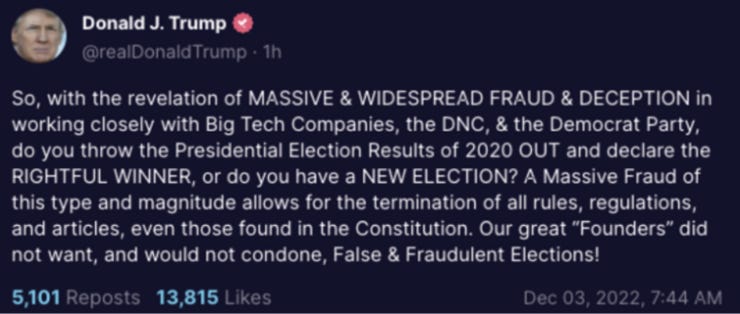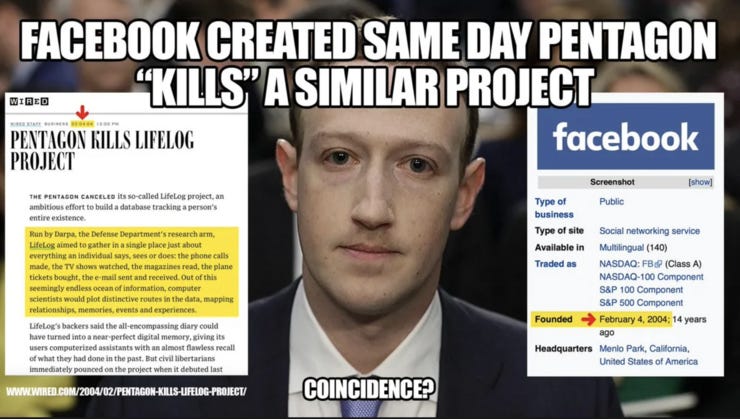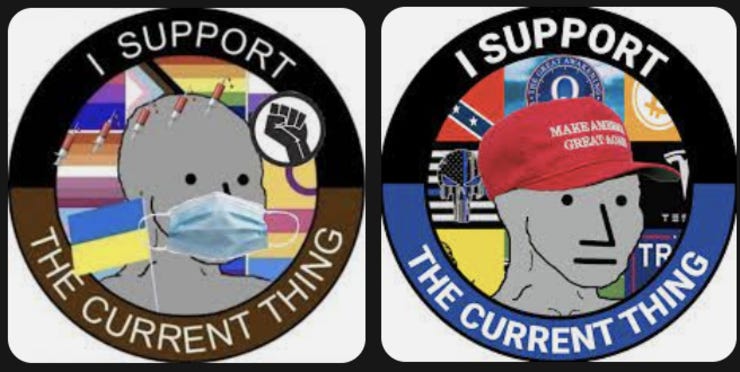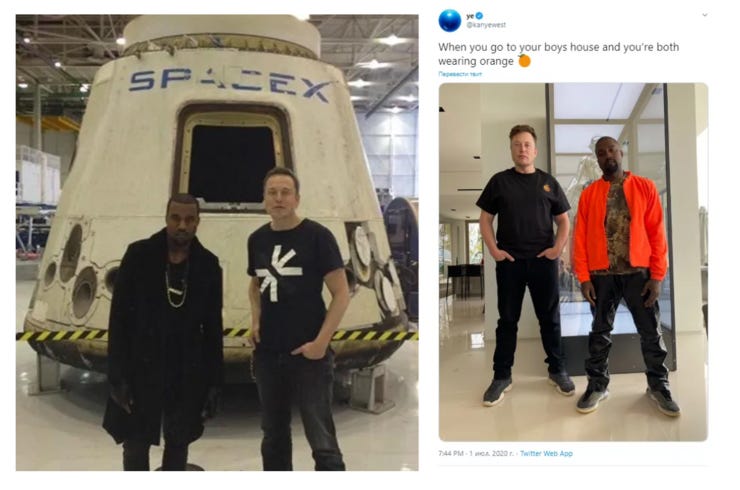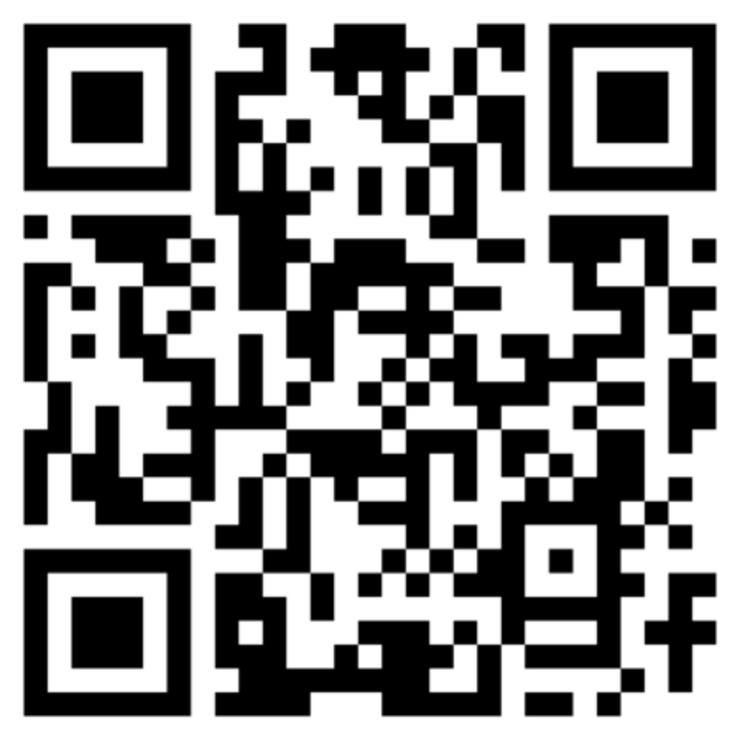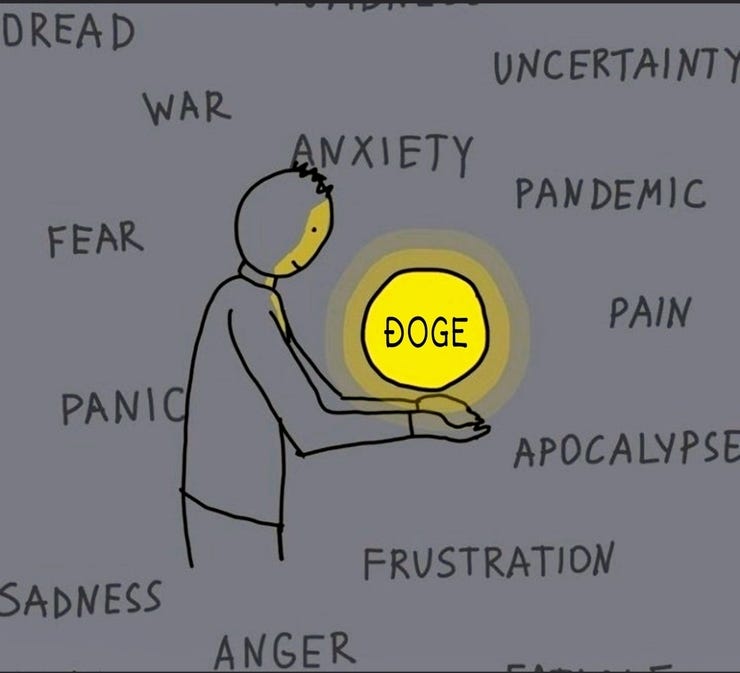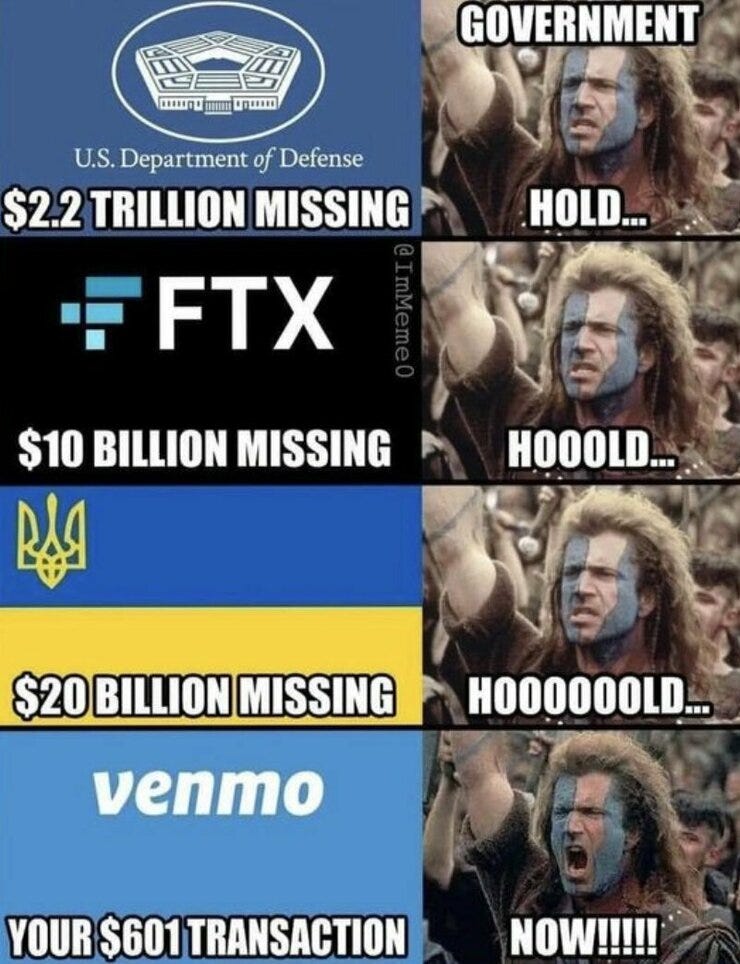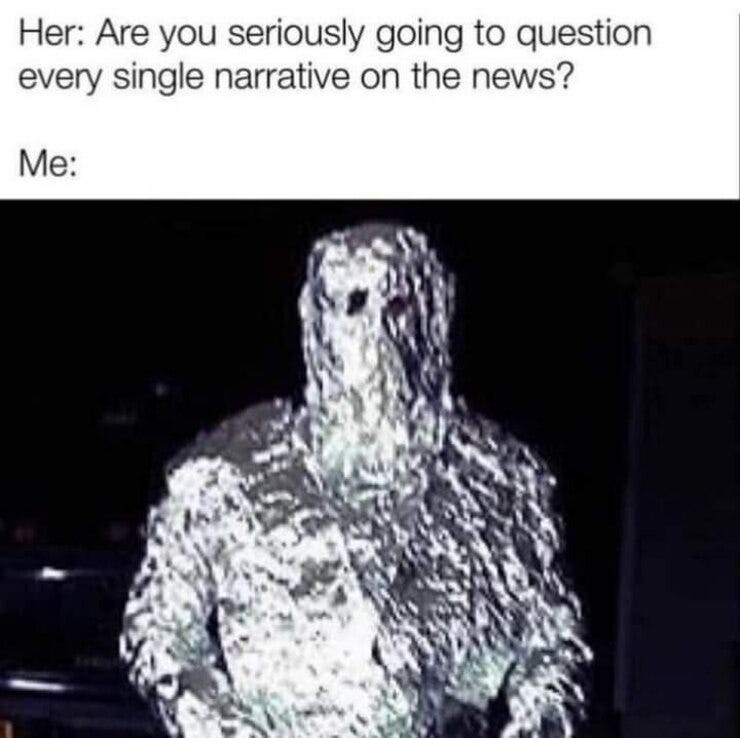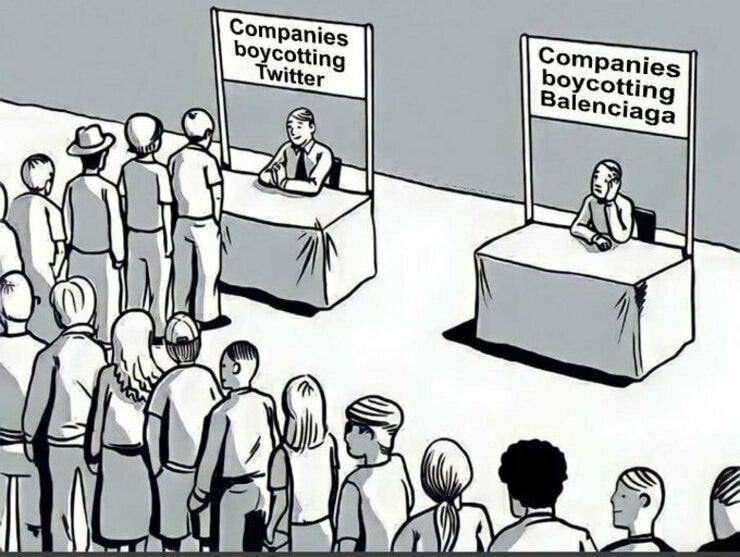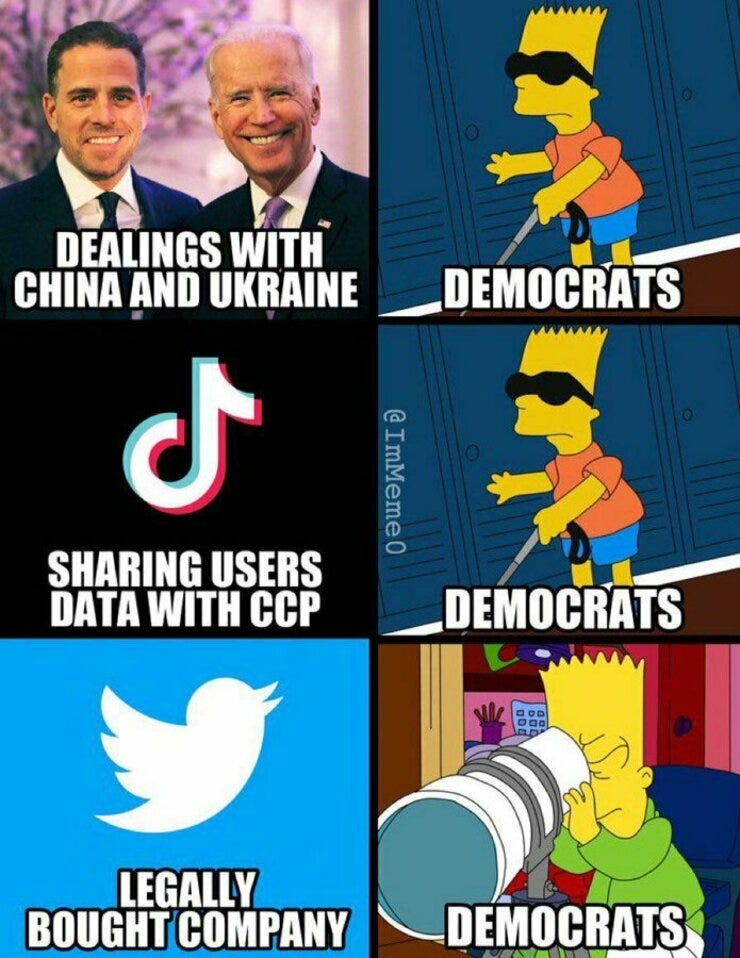This Is Why Twitter Is The World's Most Important App
Hey everyone,
Twitter is fast becoming the Internet’s essential app for news.
The past week saw several bombshell stories drop. Twitter’s coverage blew everything else out of the water.
Let’s look at how Elon’s dustup with Apple could pave the way for Dogecoin payments, the meaning of the Twitter Files, and the madness of the Ye/Alex Jones episode.
The Two-Day Apple War
Elon may own Twitter, but the battle for control of the narrative has just begun.
Last month, the idea to remove Twitter from Apple and Android phones was floated in op-eds from the NY Times and Washington Post.
Elon responded to the story by saying that he would build an alternative phone if he had to, but hoped it could be avoided.
Then, a few days later, he revealed that Apple had had stopped advertising on Twitter and actually threatened to boot it from its app store, but wouldn't say why.
Rather than back down from Apple, Elon went to war.
First, he criticized Apple's "secret 30% tax" on app store purchases.
The controversy over the Apple tax has been going on for a couple years.
In 2020, Epic Games filed an anti-trust lawsuit against Apple for removing Fortnite from the app store after Epic added its own in-app payment system to the game that circumvented the 30% tax.
Epic claimed the tax is an abuse of Apple's monopoly on iPhone app distribution, and likened Apple to Big Brother in a satirical video. (Apple doesn't allow alternative App stores on its phone, giving it control over which apps users can download on their phones).
In 2021, a judge ruled against Epic on nine of ten counts. The case is being appealed.
Apple's tax is a threat to Twitter 2.0.
Presumably, Elon wants Twitter 2.0 to have its own in-app payment mechanism so users can buy content directly from each other.
A 30% tax on payments runs contrary to the ethos of an open Internet creator's economy.
The idea of a middleman snatching up three tenths of the value created by independent makers is exactly the kind of rent-seeking behavior Twitter 2.0 is meant to disrupt.
The tax also gives Apple an excuse to block cryptocurrency payments because its proprietary payment processor isn't compatible with crypto.
For example, if someone wants to use Twitter to buy a news article with Dogecoin, Apple can simply refuse to accept 30% of the payment in Doge, effectively limiting which currencies Twitter can use. Apple has already used the tax to stop crypto apps from allowing NFT purchases with Ethereum.
Besides criticizing the tax and threatening to launch an alt-smartphone, Elon pressed Apple on another weaknesses: censorship.
In a poll last Tuesday, he asked users if Apple should make pubic information about content it has censored.
He pressed his advantage on the issue, reposting a tweet from LBRY, a network for digital content, which claimed that Apple required its app to censor search results relating to Covid's origins, vaccines, and Pepe the Frog.
Elon brought up Apple's censorship at a moment when it was already becoming a PR headache for the world's largest tech company.
Apple had recently attracted criticism for disabling its airdrop feature in China to prevent anti-lockdown protestors from using iPhones to share information.
Some of the protestors were employees at Apple, which has been accused of using "indentured servants" for labor in the past.
The Dogefather's tweets about Apple, at the very moment it was backpedaling from bad press about China, were yet another Corleone-like power play.
The threat of an alt-smartphone, plus the prospect being put on blast by Elon on Twitter, may have been enough to get Cook to call for a truce.
On Wednesday, Elon posted a video from a ripple pool at Apple's Cupertino campus, which he toured with Cook, along with the text, "Thanks @tim_cook for taking me around Apple’s beautiful HQ."
After the visit, he started following Cook on Twitter, and Cook reciprocated.
The episode was one more demonstration of Elon's mastery with Twitter.
His surgical use of polls, tweets, and memes to paint his own narrative allowed him to convert a potential rival into a peaceful collaborator.
A few days after the truce, Elon confirmed that Apple had "fully resumed" advertising on Twitter, along with other companies who'd previously stopped.
There's no word yet on how Apple will handle Twitter 2.0 payments, but the topic is something to watch in the coming months.
Saturday night during a Spaces discussion, Elon confirmed that crypto was indeedpart of the plan for payments: "We do want to have Twitter enable both regular payments and make it easier to transact with crypto."
Apple has a chance to help bring Dogecoin to millions of iPhone users through Twitter Payments.
Let's hope it does the right thing.
TwikiLeaks
Elon's fight for freedom is bigger than just Apple. The dustup turned out to be a prelude for an even larger battle.
Last Wednesday, EU industry chief Thierry Breton threatened to block Twitter unless Elon aggressively moderates content, stops unbanning suspended accounts, and agrees to an "extensive independent audit."
The big reaction from the EU is another sign that Elon's free-speech campaign poses a threat to powerful people across the world.
If anyone has the resources to go toe-to-toe with world governments, it's Elon.
On Wednesday, he tweeted that Twitter had interfered in multiple elections. How many illegitimate regimes does he have the goods on?
Friday night, we got a glimpse of what he was talking about with the release of the first installment of "The Twitter Files."
The first batch of documents was released by journalist Matt Taibbi in a 36-tweet thread Friday night.
The tweets presented Twitter's internal communications showing the decision to censor stories about Hunter Biden's laptop in the days leading up to the 2020 election.
Importantly, the documents establish that, while Twitter censored the story on the basis that it used "hacked materials," no one at the company ever had any evidence the laptop had been hacked.
After Taibbi released the documents, we learned that the FBI "pre-bunked" the Hunter Biden story in advance of release by telling social media companies to expect "a hack and leak operation that would involve Hunter Biden."
It's not clear on what basis the FBI gave this warning, especially since the Bureau was in possession of the Biden laptop since 2019.

Reactions to the Twitter Files were divided along political lines.
Establishment media ignored the story, downplayed its significance, or attacked Elon/Taibbi for releasing documents with the names of former Twitter employees.
A common talking point for the establishment was that Taibbi was doing "PR" for "the richest man in the world."
Independent voices on Twitter tended to see the documents as a bigger deal because they reinforce the impression that Democrats, big tech, and government agencies colluded to get Joe Biden elected.
Also notable was the revelation that Twitter fielded requests from both the Biden and Trump campaigns to censor specific tweets from regular citizens. Elon has promised to make public all such requests.
Not surprisingly, Trump called for the 2020 election to be overturned.
By all appearances, Friday's release was the first step in Elon's campaign to wrest information control away from legacy media, governments, and political parties, and restore it to the people at large.
A related weapon at his disposal is Starlink, which can be understood as a tool to disintermediate governments from information control.
In the current system, intelligence agencies can monitor Internet traffic by controlling choke points in terrestrial infrastructure.
Starlink (along with the encrypted messaging protocol Twitter is implementing) should allow people to communicate without being having their data intercepted by big brother.
Hopefully Elon doesn't have to resort to releasing evidence of corruption over Starlink, but you never know.
With each passing week, Elon amasses ever greater power.
He's up against some of the most formidable foes imaginable: governments, media, and the world's biggest corporations.
At stake is nothing less than civilization itself.
Pro PsyOps
While The Dogefather projects strength outwardly, he's also cleaning house inside Twitter.
Early Monday morning, he made light of the problem of "pro psy ops" on the platform.
He later posted two memes on the topic, including one featuring Pepe the Frog in the "Current Thing" format.
"Psy Op" is short for psychological operation, essentially a propaganda campaign to influence hearts and minds.
Elon's reference to "pro" PsyOps hints that US government agencies are using social media to influence the thoughts, feelings, and behavior of American citizens.
PsyOps are another layer of the onion on social media that go deeper even than the revelations from the Twitter Files.

At least since Edward Snowden, there have been questions about government agencies' activity on social media.
Hypothetically, if the government were to build software to track and influence people's behavior, it'd look an awful lot like social media does today.
Facebook famously admitted to experimenting with user's emotions in 2014. It's naive to think the practice stopped because of a little bad PR.
The CIA, with its rich history of psychological warfare at home and abroad, is an obvious candidate to use social media to exert control over the population.
Of course, foreign agencies have just as much reason to wage war over the Internet as anyone else.
An internally divided country is a weak country. There's an argument to be made that the culture war is an elaborate PsyOp to keep citizens so distracted fighting each other that they're unable to address issues of national importance.
This idea has been getting more attention lately with revelations about the differences between Chinese and American TikTok.
A common feature of psychological operations is that, like astroturf campaigns, they try to make it appear more people believe something than actually do.
They do this in order to enlist new participants, knowing that humans are social animals and orient their beliefs, at least in part, based on what others around them believe.
The formula is simple: enlist a few celebrities to post about a hashtag, amplify the posts with a slew of bot likes/retweets/comments/news articles, and shadow ban/de-boost dissenting opinions.
It's easy to dunk on mainstream media for being fake, but Twitter, Facebook, Instagram, TikTok, and other apps make it ridiculously efficient to create the impression of false consensus through bots, algorithmic boosting, and shadow-banning.
In a lot of cases, the main difference between old and new media is that social media PsyOps have more authentic-seeming production values than traditional media, and make it easier for bystanders to enlist as unknowing participants.
Maybe the best way to think of psychological operations as memetic warfare. Someone is trying to write the software in your brain without you realizing who they are or what they're doing.
Like memes, PsyOps are just as likely to deploy true information as false: what makes it a PsyOp is that the information is being used for a manipulative purpose.
Just as the best lies contain a mix of 90% true/10% false information, PsyOps are engineered to win trust with truth so, at a later time, they can slip something past your BS detector.
There's also such a thing as a benevolent PsyOp designed to awaken people to hidden realities, instill positive habits, or bring together communities. Still, historically, most government campaigns are designed to divide, scare, anger, or distract.
The list of things that might be a PsyOp is essentially endless. Here are a few worth pondering:
Crypto: much of the online crypto space is potentially a PsyOp to siphon liquidity and attention away from the few cryptocurrencies with genuine utility, such as the cottage industry of alt-dogcoins that has sprung up around Doge; SBF/FTX is arguably a PsyOp to bring about crippling regulation of crypto
The Great Awokening: social media campaigns around far-left woke causes often display a dizzying level of coordination, and there are legitimate questions about where all the money goes
Conspiracies: Flat Earth, Bigfoot, and other conspiracy theories have been hypothesized to be PsyOps to make truth seekers look like lunatics; the online phenomenon known as QAnon has been posited to be a CIA PsyOp to make Trump supporters look like "a bunch of kooks"
Covid: Aspects of the govt/media response to the pandemic resemble a psychological operation, best exemplified by the simulated pandemic Event 201; similarly, some of the fringier counter-claims (Covid was caused by snake venom in the water, the vaccines contain self-replicating nanobots, etc) may have been deliberately injected to cast shade on more grounded critiques of the official pandemic response
War: Very rarely do whole populations demand their governments start or join wars; there is almost always an act of deceptive salesmanship on the part of the military-government-media axis to convince the public to expend tax dollars and human life fighting a faraway enemy instead of improving conditions at home
At the absolute outermost fringes of speculation, the hilarious Dead Internet Theory posits that the Internet is largely devoid of real people and the government populates it with AI to gaslight the world population into believing whatever it wants
Because it's possible to make the argument that everything is a psychological operation, it's always worth considering, for balance, the default explanation: social phenomena emerge from the uncoordinated actions of thousands of people.
However, if history is any guide, there are almost certain to be multiple PsyOps in operation against the American public at any given time.
Psychological operations usually more obvious with historical distance than in present. The trick is to look at the present as if it were already history, pick out the Current Thing campaigns most likely to be propaganda, and ask why some powerful interest might benefit from the public holding this or that belief.
Just as important is to develop defenses to keep PsyOps at arm's length.
Algorithms have an amazing ability to locate precisely the content that is most triggering to each of us, and when we are triggered, we become easier to manipulate.
Learning to see the algorithm as a sparring partner for personal development, rather than a source of things to have strong feelings about, is an underrated use for social media.
Memes are particularly useful in this regard, recontextualizing life or death cultural issues as hilarious jokes, regardless of whether the issues are genuine, artificial, or somewhere in between.
Most influence campaigns feed on negative emotions. Humor creates the distance necessary to experience something as amusing rather than triggering.
In a social media landscape rife with falsehood, comedy is the realest thing there is.
FAFO: Operation Ye
The concept of psychological operations is a useful lens to view much of what happens on the Internet.
The thin line between reality and performance came to life last week during a wild series of events involving Alex Jones, Ye, and Elon.
On Thursday, Ye was interviewed by Jones on InfoWars, making several statements calculated to set the Internet aflame.
Most notably, he told Jones, "I see good things about Hitler, also. Every human being has value that they brought to the table, especially Hitler," and, "I love Jewish people. But I also love Nazis.” He later added that he believed Satan was working through Hitler.
After the interview, he posted a tweet signed by Jones that seemed to hint he soon planned to test Elon's limits for acceptable speech on Twitter. Elon responded with a reflection on turning the other cheek.
From there, Ye posted a "Prayer for World Peace" and a picture of a swastika entwined with a Star of David, along with the text, "YE24 LOVE EVERYONE #LOVESPEECH." His final tweet was a photo of Elon being sprayed with a hose by businessman Ari Emmanuel.
Ye was given an indefinite suspension from Twitter for "incitement to violence." Elon responded to the swastika tweet, "This is not ok."
Elon later explained the suspension with the acronym, "FAFO" while Ye retreated to Truth Social and posted a screenshot of a text conversation with Elon.
The happenings were so outrageous that it's worth asking if they didn't originate from some sort of movie script.
Ye almost always operates in the realm of performance art anyway. Lately, folks have speculated that he is acting out a PsyOp to seed the right with antisemitism.
People routinely question the authenticity of Alex Jones, too. He has long been hypothesized to be "controlled opposition" to make anti-globalist libertarians look like angry maniacs.
Even Elon is frequently accused of being a spokesman for this or that secret plot.
In the aftermath of the episode, though, it's not clear any of these supposed agendas were advanced.
Arguably, the events ended up benefitting Twitter in a roundabout way, not least because of all the publicity it generated.
Intentional or not, Ye's ban had the effect of establishing the limits of speech on the new Twitter: posting a swastika will get you suspended, even if you claim to be using it as a symbol of love and you are Elon's friend.
The incident also gave conservatives a chance to openly repudiate anti-semitism.
For the most part, they took advantage of the opportunity to trash "Operation Ye." It was a rare occurrence of the Overton Window shifting to the right.
Finally, mainstream media has been desperate to paint the new Twitter as a breeding ground for hate, but, so far, the best it can point to is Ye, who is kind of underwhelming as an avatar for white supremacy.
After spending the last several years conjuring fears of a lower-class white-hooded uprising, media got stuck with the richest black man in history wearing an all-black bodysuit claiming Elon is a Chinese clone.
These same outlets who have been pillorying Elon for loosening content moderation on Twitter had to report that he suspended Ye, torpedoing the narrative that Elon is turning the platform into a hate-factory. (As circumstance would have it, Elon has also refused to reinstate Alex Jones two weeks ago, further angering conservatives and perplexing liberals).
All in all, it's hard to imagine Twitter's first high-profile content moderation incident going better if it had been planned out...
Or maybe the whole thing is just three wildly unpredictable individuals drifting into each others' orbits and sowing chaos on an exponential scale.
As with so much that happens on the Internet, sometimes the only reaction that makes any sense is
¯\_(ツ)_/¯
Stay tuned
This may have been the wildest week on Twitter so far.
Elon appeared to resolve his brief dustup with Apple through tactful tweeting. He continues to amass power in his battle to free information from big brother and return it to the people.
The release of the first installment of the Twitter Files was a historic event, offering the best proof yet of collusion between big tech and the political establishment.
How far does the Twitter rabbit hole go? The topic of social media PsyOps is potentially bottomless. As far as anyone knows, the Internet may well be a giant intelligence operation.
The true meaning of the Elon/Ye/Alex Jones events is anyone's guess. It wouldn't be surprising if some part of the episode were scripted. Separating reality from simulation takes a discerning eye, a willingness to speculate, and a tolerance for uncertainty.
Twitter is on its way to becoming the world's most vital news hub. Stay tuned.
Dogey Treats: News Bites
Neuralink
At Neuralink's Show and Tell last week, Elon announced human trials for brain implants are expected to begin in six months. The implants are designed to restore bodily functionality for disabled people, including paralysis and blindness.
Artificial Intelligence
OpenAI released ChatGPT3, a language model that produces human-like text. It is capable of writing essays, poems, rap battles, and skits from text prompts. Elon liked a ChatCGP poem written about Dogecoin, but paused its access to Twitter's database.
Tesla
Tesla delivered its first electric Semi trucks to Frito Lay. The trucks are capable of completing a 500-mile drive while towing 81,000 lbs on a single battery charge.
Tesla won a lawsuit against a news outlet that called Giga Shanghai a "modern-day sweatshop."
Elon appeared on a three-hour-long Twitter Spaces Q&A on Saturday to discuss the Twitter Files and other topics. After the event, he posted a Twitter poll about Julian Assange and Edward Snowden. The majority of more than three million voters said they should be pardoned.
Elon called NY Times article about hate speech on Twitter "utterly false." Twitter continues to crack down on child exploitation.
Sam Harris released a two-hour podcast about why he left Twitter.
Twitter will start including view count for tweets. Elon encouraged more people to start tweeting and posted a meme about Twitter's servers being overloaded.
Twitter is no longer enforcing its Covid misinformation policy.
A large number of Dogecoin accounts were suspended from Twitter. Elon fixed the issue.
Ye is no longer buying Parler.
Crypto
Elon tweeted a GIF from The Godfather. Joe Rogan discussed Dogecoin and Bitcoin on a recent podcast. EAG, a factory-authorized dealer for Aston Martin, started accepting Dogecoin through BitPay.
Genesis owes $900 million worth of crypto to Gemini exchange, owned by the Winklevoss twins. Crypto exchange Kraken announced it was laying off 30% of its staff.
Ripple filed its final brief in its case against the SEC and asked for Summary Judgement.
In recent weeks, three crypto millionaires have died under mysterious circumstances.
FTX/SBF
SBF claimed that he donated as much money to Republicans as Democrats, but did so through dark money groups to avoid bad press.
Democrat Maxine Waters tweeted at SBF, writing, "@SBF_FTX, we appreciate that you've been candid in your discussions about what happened at #FTX. Your willingness to talk to the public will help the company's customers, investors, and others. To that end, we would welcome your participation in our hearing on the 13th." SBF appeared virtually at the NY Times's Dealbook Summit and was applauded.
Elon estimated that SBF donated over $1B to Democratic politicians, well in excess of the $40M reported. He asked, "The money went somewhere, so where did it go?" He also posted a meme in response to SBF stan account Autism Capital.
BlockFi is suing SBF's holding company for his Robinhood shares. People are struggling to explain why SBF isn't in handcuffs yet.
Global Financial System
OPEC is contemplating additional production cuts.
Private equity firm Blackstone appears to have a liquidity problem with its real estate fund.
Indonesia's central bank announced plans for a CBDC.
Elections
Elon expressed concern about the ongoing election controversy in Brazil
Thank You!
Thanks for reading! Consider sending a tip or Super Following on Twitter to help keep the newsletter going!
DJ2zTEdHBD3guHLfVaNBaypr6bHFG5Nwfw
Memes of the Week
It's ALL Risky!
Thank you, kind reader, for reading and subscribing to this newsletter. I really appreciate it!
If you haven’t already, please sign up to this email newsletter for more weekly articles like this one. Also, please share it with a friend or on twitter if you enjoyed this article.
What do you think? Will Elon save civilization? Let me know!
Remember, Dogecoin is risky. But then again, it’s all risky!
Follow on twitter at @itsALLrisky
Send an email to itsALLrisky@gmail.com
Send a Doge tip: DJ2zTEdHBD3guHLfVaNBaypr6bHFG5Nwfw
This article was written in collaboration with @CryptoDogDivine, give them a follow!
Don't forget to subscribe to this newsletter!
Disclaimer: This is not financial advice and I am not a financial advisor. The article above references an opinion for entertainment purposes only and it is not investment advice. Always assume that the author of the article is actively trading and that the opinions expressed may be biased towards the author’s holdings. Do your own research and consult with a licensed financial adviser before making any investment decision. Do not treat any opinion expressed in this newsletter as a specific inducement to make a particular investment. Content, news, research, tools, and securities symbols are for educational and illustrative purposes only and do not imply a recommendation or solicitation to buy or sell a particular security or cryptocurrency or to engage in any particular investment strategy. The information provided is not warranted as to completeness or accuracy and is subject to change without notice. The projections or other information regarding the likelihood of various investment outcomes are hypothetical in nature, are not guaranteed for accuracy or completeness, do not reflect actual investment results and are not guarantees of future results. All investments involve risk, losses may exceed the principal invested, and the past performance of a security, industry, sector, market, cryptocurrency, or financial product does not guarantee future results or returns. Dogecoin is a speculative and highly volatile asset susceptible to pump-and-dump schemes.
At the time of publication, Dogecoin is around $0.10 per coin.














